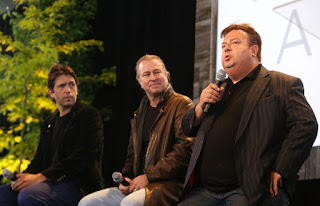Body of lies movie review
Body of Lies
Review by Zulfi
Before coming into movies, Ridley
Scott was an adman. He has this penchant for thinking outside the box. Tagging along
with Martin Scorsese, Spielberg, Robert Zemeckis and some others, he lives for
his art. In his long career of nearly
forty to fifty years, he had this diverse array of topics he delved into. He
dealt with artificial intelligence in blade runner and tried to probe for any living
contact outside of space in his ‘alien’. He talked about the roman era of gladiatorial
tournaments and also an intelligent cannibal’s lust for human blood. He did one
of the greatest war movie and recently a stranded man in Mars. I always thought
he excelled in the movies which were very different from modern world. Him doing
a modern day movie was something i didn’t believe he could do with the same
gusto as the other diverse plots provided. But in ‘Body of Lies’, i felt he had
excelled himself. For me, it was my favourite of this famed man.
‘Body of lies’ starts with a CIA
field operative, Roger Ferris (Leonardo DiCaprio) in Iraq doing the dirty and dangerous
work bestowed by his rotund and uncaring boss, Ed Hoffman (Russell Crowe). He notices
that his sincere and moral approach to work is incongruent to his boss’s
thinking, which shows as it takes the life of the former’s subordinate. When Roger
is taken on his next mission to snare the master terrorist, Al Saleem, he comes
across the diverse work ethics of both the American and Jordanian intelligence,
the two boats, which he should ride with each foot on one. He is not new to
this game, but then his boss makes it all novel. Mark Strong, who plays as the
head of Jordanian Intelligence (Hani Pasha) is an excellent addition to the
cast. You could see his theatrical skills making him wear the wool of an Arab
so well. You could easily consider him a native of Middle East, with the way he
talks and walks. Russell Crowe is a completely different act. I couldn’t compare
the man with the vibrant persona of ‘LA confidential’ cop. He is slouchy,
conniving and manipulative always playing by his rules disregarding his
subordinate’s position. He counsels his junior that he shouldn’t go by face
value. And beneath this hard headed and ruthless operative, he is right and
yes, he does feel for his man.
Leonardo DiCaprio doesn’t need
any more applause. He plays the role of the agent with such a deft hand. He shows
how the real heroes do their hands dirty gathering no credit while the senior
bosses usurp their sweat. He brings the
movie a great relish, a fresh feel of thinking and pulls us under the skin of
the story, which has many twists and turns. The way he utters the dialogue, ‘Hani
wanted patience, not as a personal quality but as an operational requirement’,
shows us the way Leonardo gets under his character. He is the endearing
foreigner when he is romancing the native (nurse) beauty (Golshifthe Farahani).
But mention should also be made for Al Saleem. Alon Abutboul plays him as
silent but a dangerous and unnerving fellow. He fits the bill when a character
describes him as having ‘false modesty’.
But obviously the best part of
the movie is the way the agents from both west and east play see-saw to capture
the terrorist mastermind. Ridley Scott manages to show us how everything is not
how we think it is. Jordanians have their own limitations in their honest
motives. Americans play underhand to get more than they want. But this sentence
is amoeboid in virtue as it may shift anyway. In a scene between Hoffman and
Hani, the former in a flamboyant manner forgets all the niceties that Roger
struggles to observe, to the latter’s discomfort. Hoffman’s formulation of the
sentence ‘your majesty, I want control’ explains everything regarding the overseas
relations between the king and Uncle Sam. The way CIA sniffs out Al Saleem
using the electronic ploy is a masterstroke. But the thing which made me say
wow was when the director uses the simple trick to raise desert dust to cloud
aerial surveillance. The statement is a figurative way of putting mind over
technology.
The story though depicts a well
spiced and craftily handled visual thriller, there is moral that there is a lot
of internal struggle on both sides of the same coin. Good intentions are everywhere
but the conditions determine if they will change into something or the exact
opposite of it. Hani and Hoffman find trusting will be their shortcoming, while
Ferris thinks he should hazard shortcomings for trust. To each his own. But he
is the one who walks around free at the end. Did his trust make him so
liberating? Or is his liberation the result of his moral blindness? The argument
will be inconclusive.




Comments
Post a Comment